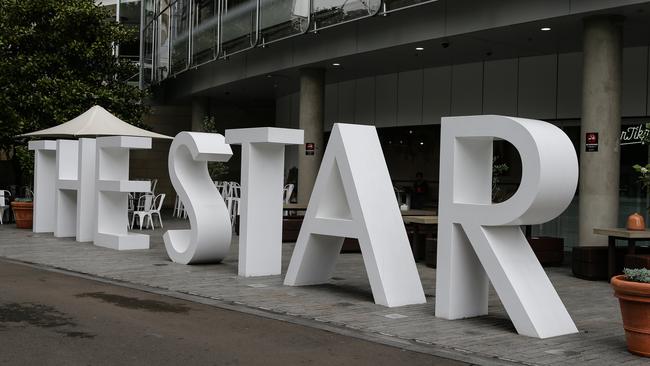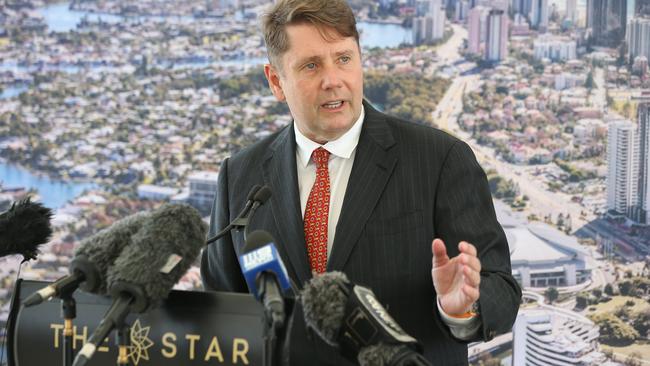The Star still betting on Asian gamblers, amid fallout from Crown report
As Crown’s rival negotiates with NSW casino regulators, it still sees a future with Asian gamblers once borders reopen.

Star Entertainment’s operations in Queensland are helping boost its business as it recovers from the impact of stricter COVID restrictions in Sydney and gears up to deal with the prospect of competition from Crown.
Releasing its results for the six months to the end of December, which showed a 33 per cent fall in statutory net profit to $51m on the back of a 30 per cent fall in revenue to $741m, Star chief executive Matt Bekier described the performance as “respectable” given the impact of COVID restrictions and the lack of international tourists which traditionally contribute some 10 per cent of revenues.
He said the group’s operations in the Gold Coast were recovering well from the COVID downturn and were benefitting from the “pent up demand” for tourism.
He said the Gold Coast property had recently benefitted from its first conventions since the COVID shutdowns.
“In January we did more food and beverage business in the Gold Coast than we did during the Commonwealth Games in 2018,” he told The Australian.
Mr Bekier said Star, which received $103m in JobKeeper payments through the half, was benefitting from a relaxation of restrictions in Sydney where it could now operate at 50 per cent of capacity, up from 15 per cent from February 12 while its venues in Brisbane and the Gold Coast were operating much closer to normal.
Star’s VIP revenue was hardest hit during the half with revenue down by 95 per cent to only $8m compared to the 39 per cent drop in domestic business to $379m.
For the first six weeks of 2021, its domestic gaming revenue back up to 81 per cent of the same period last year while group domestic revenue was running at 80 per cent of the same period last year.
But Mr Bekier said that COVID restriction were still forcing the company to operate more “conservatively” than it had been before the pandemic.
He said the opening of Star’s property in Brisbane’s Queens Wharf at the end of 2022, and plans for more accommodation at the Gold Coast would see a shift in the importance of it operations in Queensland.
“Historically NSW has always been 70 per cent of our revenue,” he said.
“With the investments we have been putting into the Gold Coast and when Queens Wharf is up and running we will have more than 50 per cent of our revenues out of Queensland.”
He said the opening of the Queens Wharf development would mean that the Brisbane property was the second largest contributor to Star’s revenues.
“Sydney will still be the largest property but once Queens Wharf is fully built out, it might rival Sydney in terms of its revenue and earnings.”
Mr Bekier played down the impact of the Bergin inquiry on its future operations in New South Wales as potential rival Crown negotiates its future with the NSW Independent Liquor and Gaming Authority.
He said the company would engage with the NSW casino regulator on the recommendations of the report.
“We are looking forward to working with the regulator to understand what it (the report) means for us, especially for future VIP business,” Mr Bekier told analysts on Thursday.
Mr Bekier said that Star had been diversifying its source of growth in revenue from VIP gamblers away from its dependence on junket operators and more towards premium mass gambles for the past few years.
He said the company would be stepping up its pitches to tourist and business gamblers in Asia through its offices in Singapore and Hong Kong once the borders were open to international tourists but was not expecting a return of the super high rollers brought by junket operators which are expected to be banned in New South Wales.
He said this would see a reduction in some costs including the need for jets to transport VIP gamblers in Australia.
Mr Bekier said the junket business operated on lower margins of around 10 per cent earnings to revenue compared with 30 per cent earnings to revenue from premium mass customers.
But he said if junkets were banned in NSW there would still need to be a lot more trips to Australia generate to make up for the revenue from the big spending gamblers traditionally brought into the country by junket operators.
Mr Bekier said he did not expect Star would have to pay much more than the current $8 million a year in regulatory costs to the NSW Independent Liquor and Gaming Authority as a result of the recommendations of the Bergin report.
He said he was “not worried” about any additional regulatory and compliance costs which may be imposed on Star as a result of the recommendations of the inquiry.
He said Star had been “very supportive” of having a strict regulatory regime for casinos in NSW and was not expecting the review would “overburden the business with added regulation.”
Star operates the sole casino in New South Wales at Sydney’s Pyrmont.
Star said its net profit for the first half of the financial year had been hit by border closures which made it harder for domestic and international visitors to travel to its properties in Sydney, the Gold Coast and Brisbane.
The lower profits meant that Star, which paid a dividend of 10.5 cent a share for the first half of last financial year, will not be paying a dividend for the first half of this financial year.

The lower profits meant that Star, which paid a dividend of 10.5 cent a share for the first half of last financial year, will not be paying a dividend for the first half of this financial year.
On a normalised basis, which reflects underlying performance and strips out volatility in VIP win rates, Star’s net profit was $63m, down 50 per cent, and revenue was $733m, down 35 per cent.





To join the conversation, please log in. Don't have an account? Register
Join the conversation, you are commenting as Logout